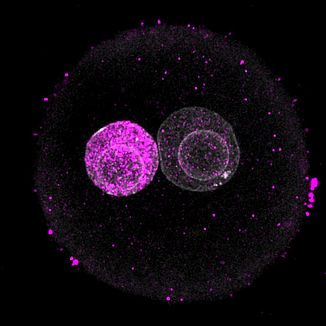Fertilized egg cells trigger and monitor loss of sperm’s epigenetic memory

A mouse zygote in which the maternal genome remains highly methylated (5mC, magenta) while the paternal genome looses its methylation shortly after fertilization.
The events triggered when sperm meets an egg are not only life changing for the parents but deeply fascinating from a scientific point of view, too.
The mother of all cells
Following fertilization, DNA from the mother’s egg cell and the father’s sperm cell constitute the genetic blueprint of the single-cell embryo or zygote. The incoming paternal DNA contains modifications that facilitate an “epigenetic memory” of its sperm state. Proteins provided by the fertilized egg act to largely erase this memory in order to generate a totipotent embryo that can give rise to a whole new individual.
The mechanisms underlying natural reprogramming to totipotency are remarkably efficient but remain poorly understood. “To put this into perspective, reprogramming to induced pluripotency in cell culture takes several days to weeks whereas reprogramming to totipotency in zygotes occurs in less than 24 h”, says Kikuë Tachibana-Konwalski, who devotes her laboratory’s research to understanding the molecular secrets of egg cells and zygotes.
New life, new epigenetics
Reporting research in the scientific journal Cell, Vienna-based scientists from the Institute of Molecular Biotechnology (IMBA) have discovered that not only do fertilized egg cells trigger epigenetic reprogramming of sperm DNA but this process is closely monitored to safeguard genomic integrity.
“When the sperm enters the egg cell, the densely compacted male chromatin has to be entirely ‘unpacked’ and restructured around protein scaffolds called histones,” explained Sabrina Ladstätter, first author of the study.
“Using fertilized mouse eggs, we showed that the egg cell actively triggers demethylation of the paternal DNA – in other words, it initiates epigenetic reprogramming by stripping any previous epigenetic memory passed on from the father. This allows the zygote to start afresh and create its own epigenetic memory and life history. This process is not without risks: demethylation can cause lesions in the DNA that can be fatal for the new organism. It is known that these lesions can lead to chromosome fragmentation, embryo loss or infertility.”
A molecular checkpoint
The researchers identified a surveillance mechanism that not only monitors DNA lesions caused by epigenetic reprogramming but also fixes the damage. They revealed that lesions in the paternal DNA caused by demethylation activate a zygotic “checkpoint” that prevents cell division until these lesions are repaired. This mechanism therefore ensures that reprogramming is completed within one cell cycle and protects genomic integrity at the volatile single-cell embryo stage. Interestingly, they also found that the conditions under which embryos are cultured affect the stringency of the checkpoint response.
Hope for better IVF treatments?
“Our findings have potential implications for improving in vitro fertilization techniques,” said Kikuë Tachibana-Konwalski, senior author of the study and a group leader at IMBA. “It will be exciting to explore how cell culture conditions enhance the zygote’s intrinsic surveillance and repair mechanisms, thus leading to better quality embryos and potentially more successful pregnancies.”
Original Article:
“A surveillance mechanism ensures repair of DNA lesions during zygotic reprogramming”, Ladstätter, Tachibana-Konwalski, Cell: http://dx.doi.org/10.1016/j.cell.2016.11.009
Press picture: http://de.imba.oeaw.ac.at/index.php?id=516
Media Contact
All latest news from the category: Life Sciences and Chemistry
Articles and reports from the Life Sciences and chemistry area deal with applied and basic research into modern biology, chemistry and human medicine.
Valuable information can be found on a range of life sciences fields including bacteriology, biochemistry, bionics, bioinformatics, biophysics, biotechnology, genetics, geobotany, human biology, marine biology, microbiology, molecular biology, cellular biology, zoology, bioinorganic chemistry, microchemistry and environmental chemistry.
Newest articles

A universal framework for spatial biology
SpatialData is a freely accessible tool to unify and integrate data from different omics technologies accounting for spatial information, which can provide holistic insights into health and disease. Biological processes…

How complex biological processes arise
A $20 million grant from the U.S. National Science Foundation (NSF) will support the establishment and operation of the National Synthesis Center for Emergence in the Molecular and Cellular Sciences (NCEMS) at…

Airborne single-photon lidar system achieves high-resolution 3D imaging
Compact, low-power system opens doors for photon-efficient drone and satellite-based environmental monitoring and mapping. Researchers have developed a compact and lightweight single-photon airborne lidar system that can acquire high-resolution 3D…





















